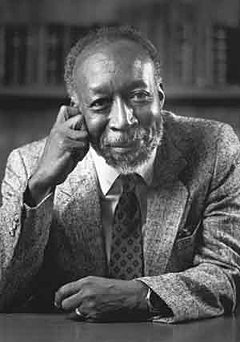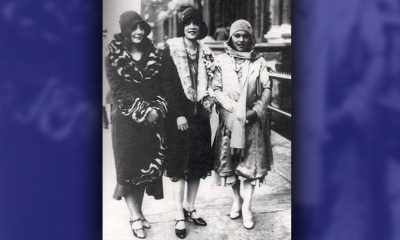National
Noted Author John A. Williams Dead at 89
By Herb Boyd
Special to the NNPA
NEW YORK (NNPA) – “Mine was a simple hunger,” John A. Williams said of his early desire to become a writer, “to know more than I then knew, and to set it down.” That simple hunger grew ravenous over the years and Williams wrote more than 20 books, including perhaps his most popular, The Man Who Cried I Am. Williams, 89, died July 3 in Paramus, N.J. according to a notice from Syracuse University, where he attended and earned degrees in English and journalism.
If he were not as well-known as many writers of the 1960s, he nevertheless had a loyal following among the radical intellectuals then – and now – and his essays, non-fiction books about Black history, journalism, and his novels were consistently rewarding and captured the essence of the flourishing Black arts movement.
He caused quite a stir when The Man Who Cried I Am was published. To promote the book, Williams excerpted the King Alfred Plan, a fictional plot by the CIA to eliminate Black people, made copies and placed them on the seats of subways in New York City. Readers were unaware of the ruse and believed the plan to be real.
Born in Jackson, Miss., Williams joined the Navy during World War II and used the GI Bill to complete his education at Syracuse. After a series of menial jobs, he began to seriously pursue a career as a writer, thanks to the portable typewriter given to him by his mother-in-law. “That was my life jacket,” he said.
Williams worked as public relations writer, copy editor, and hack journalism, as he called it, for numerous small publications and “girlie” magazines before landing assignments at Ebony, Jet, and, particularly Holiday magazine. At one point, he even tried to publish his own newsletter but that floundered and he worked as a grocery clerk, in a foundry, and practically any kind of employment to take care of his family.
Much of this period of his life, in the 1940s and 1950s, is vividly recounted in a chapter he did for Men On Divorce – The Other Side of the Story. “There had been occasions when my ‘Homies’ called me ‘The Writer,’ knifing deeply into the hunger I was only vaguely sure I had,” he wrote.
With his writing zipping along at a promising clip, his novel Night Song, about a talented musician akin to Charlie Parker, was impressive enough to earn him a Prix de Rome from the American Academy of Arts and Letters in 1962, but the prize was retracted following an interview with the Academy. Williams charged that they discovered he was Black and thereby rejected him. Portions of this rejection would be fictionalized in his books, most poignantly in The Man Who Cried I Am (1967).
Other early fiction was in 1960 with One for New York or The Angry Ones; three years later, he made a bigger splash with Sissie (1963). Each book depicted protagonists in battle with the system, struggling with racism and the obstacles nullifying their humanity.
In 1963, on the strength of his novels and articles, Holiday magazine sent him across America for him to gather his impressions of where the nation was on race relations in particular. This Is My Country, Too (1965) was the result. Beyond the Angry Black (1966), a collection of essays edited by Williams gave him further recognition on the literary scene.
Several historical writers and activists are thinly disguised in The Man Who Cried I Am, specifically Malcolm X, Richard Wright, James Baldwin, and Dr. Martin Luther King, Jr. The main character is Max Reddick, whose life and activities mirrors those of the author.
Far less fictionalized but no less entertaining was Captain Blackman (1972) that basically chronicles American history and the prominent role of Blacks in the shaping of the nation.
In the 1980s, Williams added another genre to his creativity – playwright and librettist, though these attempts never really got the traction of his other pursuits. One of his books, The Junior Bachelor Society (1976), was made into a television movie.
Nothing was spared by Williams when it came to injustice and indifference. He targeted the publishing industry in !Click Song (1982), deftly sketching the travails of a struggling writer. This earned him he first of three American Book Awards.
His teaching career was almost as expansive as his writing, becoming a Regents’ Lecturer at the University of California, Santa Barbara, 1972; Distinguished Professor of English, LaGuardia Community College, City University of New York, 1973-78; visiting professor, University of Hawaii, Honolulu, Summer 1974, Boston University, 1978-79, and New York University, 1986-87. Professor of English, 1979-90, Paul Robeson Professor of English, 1990-94, and since 1994 professor emeritus, Rutgers University, Newark, N.J. Bard Center Fellow, Bard College, 1994-95. Member of the Editorial Board, Audience, Boston, 1970-72; contributing editor, American Journal, New York, 1972.
He was busy looking for a job and did not attend his graduation ceremony from Syracuse, but he was there when they presented him with an honorary doctorate. Williams retired in 1994 as the Paul Robeson Distinguished Professor of English at Rutgers University.
He is survived by his wife, Lorrain; sons Gregory, Dennis, and Adam; four grandchildren, and two great-grandchildren. And his sons have expressed that same hunger he had behind that portable typewriter.
Activism
Oakland Post: Week of April 17 – 23, 2024
The printed Weekly Edition of the Oakland Post: Week of April 17 – 23, 2024

To enlarge your view of this issue, use the slider, magnifying glass icon or full page icon in the lower right corner of the browser window. ![]()
Barbara Lee
Congresswoman Barbara Lee Issues Statement on Deaths of Humanitarian Aid Volunteers in Gaza
On April 2, a day after an Israeli airstrike erroneously killed seven employees of World Central Kitchen (WCK), a humanitarian organization delivering aid in the Gaza Strip, a statement was release by Rep. Barbara Lee (D-CA-12). “This is a devastating and avoidable tragedy. My prayers go to the families and loved ones of the selfless members of the World Central Kitchen team whose lives were lost,” said Lee.

By California Black Media
On April 2, a day after an Israeli airstrike erroneously killed seven employees of World Central Kitchen (WCK), a humanitarian organization delivering aid in the Gaza Strip, a statement was release by Rep. Barbara Lee (D-CA-12).
“This is a devastating and avoidable tragedy. My prayers go to the families and loved ones of the selfless members of the World Central Kitchen team whose lives were lost,” said Lee.
The same day, it was confirmed by the organization that the humanitarian aid volunteers were killed in a strike carried out by Israel Defense Forces (IDF). Prior to the incident, members of the team had been travelling in two armored vehicles marked with the WCF logo and they had been coordinating their movements with the IDF. The group had successfully delivered 10 tons of humanitarian food in a deconflicted zone when its convoy was struck.
“This is not only an attack against WCK. This is an attack on humanitarian organizations showing up in the direst situations where food is being used as a weapon of war. This is unforgivable,” said Erin Gore, chief executive officer of World Central Kitchen.
The seven victims included a U.S. citizen as well as others from Australia, Poland, the United Kingdom, Canada, and Palestine.
Lee has been a vocal advocate for a ceasefire in Gaza and has supported actions by President Joe Biden to airdrop humanitarian aid in the area.
“Far too many civilians have lost their lives as a result of Benjamin Netanyahu’s reprehensible military offensive. The U.S. must join with our allies and demand an immediate, permanent ceasefire – it’s long overdue,” Lee said.
Commentary
Commentary: Republican Votes Are Threatening American Democracy
In many ways, it was great that the Iowa Caucuses were on the same day as Martin Luther King Jr. Day. We needed to know the blunt truth. The takeaway message after the Iowa Caucuses where Donald Trump finished more than 30 points in front of Florida Gov. De Santis and former South Carolina Governor Nikki Haley boils down to this: Our democracy is threatened, for real.

By Emil Guillermo
In many ways, it was great that the Iowa Caucuses were on the same day as Martin Luther King Jr. Day.
We needed to know the blunt truth.
The takeaway message after the Iowa Caucuses where Donald Trump finished more than 30 points in front of Florida Gov. De Santis and former South Carolina Governor Nikki Haley boils down to this: Our democracy is threatened, for real.
And to save it will require all hands on deck.
It was strange for Iowans to caucus on MLK day. It had a self-cancelling effect. The day that honored America’s civil rights and anti-discrimination hero was negated by evening.
That’s when one of the least diverse states in the nation let the world know that white Americans absolutely love Donald Trump. No ifs, ands or buts.
No man is above the law? To the majority of his supporters, it seems Trump is.
It’s an anti-democracy loyalty that has spread like a political virus.
No matter what he does, Trump’s their guy. Trump received 51% of caucus-goers votes to beat Florida Gov. Ron DeSantis, who garnered 21.2%, and former South Carolina Gov. Nikki Haley, who got 19.1%.
The Asian flash in the pan Vivek Ramaswamy finished way behind and dropped out. Perhaps to get in the VP line. Don’t count on it.
According to CNN’s entrance polls, when caucus-goers were asked if they were a part of the “MAGA movement,” nearly half — 46% — said yes. More revealing: “Do you think Biden legitimately won in 2020?”
Only 29% said “yes.”
That means an overwhelming 66% said “no,” thus showing the deep roots in Iowa of the “Big Lie,” the belief in a falsehood that Trump was a victim of election theft.
Even more revealing and posing a direct threat to our democracy was the question of whether Trump was fit for the presidency, even if convicted of a crime.
Sixty-five percent said “yes.”
Who says that about anyone of color indicted on 91 criminal felony counts?
Would a BIPOC executive found liable for business fraud in civil court be given a pass?
How about a BIPOC person found liable for sexual assault?
Iowans have debased the phrase, “no man is above the law.” It’s a mindset that would vote in an American dictatorship.
Compare Iowa with voters in Asia last weekend. Taiwan rejected threats from authoritarian Beijing and elected pro-democracy Taiwanese vice president Lai Ching-te as its new president.
Meanwhile, in our country, which supposedly knows a thing or two about democracy, the Iowa caucuses show how Americans feel about authoritarianism.
Some Americans actually like it even more than the Constitution allows.
About the Author
Emil Guillermo is a journalist and commentator. He does a mini-talk show on YouTube.com/@emilamok1.
-

 Activism4 weeks ago
Activism4 weeks agoOakland Post: Week of March 27 – April 2, 2024
-

 #NNPA BlackPress4 weeks ago
#NNPA BlackPress4 weeks agoCOMMENTARY: D.C. Crime Bill Fails to Address Root Causes of Violence and Incarceration
-

 #NNPA BlackPress4 weeks ago
#NNPA BlackPress4 weeks agoMayor, City Council President React to May 31 Closing of Birmingham-Southern College
-

 #NNPA BlackPress4 weeks ago
#NNPA BlackPress4 weeks agoBeloved Actor and Activist Louis Cameron Gossett Jr. Dies at 87
-

 Community1 week ago
Community1 week agoFinancial Assistance Bill for Descendants of Enslaved Persons to Help Them Purchase, Own, or Maintain a Home
-

 Activism3 weeks ago
Activism3 weeks agoOakland Post: Week of April 3 – 6, 2024
-

 Business1 week ago
Business1 week agoV.P. Kamala Harris: Americans With Criminal Records Will Soon Be Eligible for SBA Loans
-

 Activism2 weeks ago
Activism2 weeks agoOakland Post: Week of April 10 – 16, 2024

















































